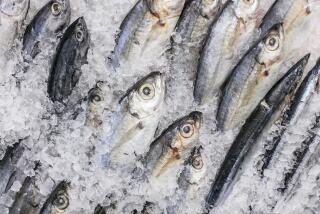Mislabeled seafood can cost consumers twice as much, study finds
A new report by Oceana, an environmental advocacy group, found that seafood mislabeling can lead consumers to pay up to twice as much for certain fish, the group said Wednesday.
The economic impact study comes six months after Ocean first reported that about one-third of seafood sold in the U.S. is mislabeled.
That two-year study of 1,200 seafood samples found that 33% were mislabeled according to U.S Food and Drug Administration guidelines.
QUIZ: How well do you know fast food?
The latest report sought to find out just how much consumers lost when they were sold cheap substitutes. According to the group, consumers who order an 8-ounce fillet of grouper in a restaurant, which sells on average for $27, but are instead given a tilapia fillet, worth $15, they lose $12.
“Swapping a lower cost fish for a higher value one is like ordering a filet mignon and getting a hamburger instead,” said Oceana senior scientist Margot Stiles. “If a consumer eats mislabeled fish even just once a week, they could be losing up to hundreds of dollars each year due to seafood fraud.”
Wednesday’s report is based on a review of 300 menus from 12 different cities to help estimate retail prices, Oceana said.
Congress in March introduced legislation intended to minimize seafood fraud. Bills are currently sitting in committee in the House and Senate.
That legislation followed the February report, which highlighted just how complex the chain is from boat to retail stores and restaurants.
Oceana said that the most commonly mislabeled fish were snapper and tuna.
Of the samples labeled as snapper, 87% were mislabeled. More than 30 different species of fish were found to be substituted for snapper, but the most common were rockfish and tilapia.
ALSO:
Napa Valley winery ages wine -- in the ocean
Zillow cheekily lists White House for $319 million
Think that’s snapper? Rampant seafood mislabeling in U.S., study says
More to Read
Inside the business of entertainment
The Wide Shot brings you news, analysis and insights on everything from streaming wars to production — and what it all means for the future.
You may occasionally receive promotional content from the Los Angeles Times.











